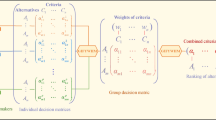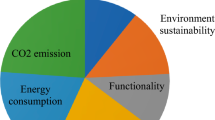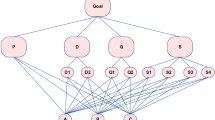Abstract
Despite the large literature about non-additive value aggregation techniques, in the large majority of applied decision support processes, additive value aggregation functions are used. The main reasons for this may be the simplicity of the approach, minimum elicitation requirements, software availability, and the appeal of the underlying preference independence concepts that may be strengthened by an adequate choice of sub-objectives and attributes. However, in an applied decision support process, the decision maker(s) or the stakeholders decide on the sub-objectives and attributes to characterize the state of a system and they have to provide information that allows the decision analyst to express their preferences as a value function of these attributes. It is the task of the decision analyst to find the parameterization and parameter values of a value function that fits best the expressed preferences. We describe a value function elicitation process for the ideal morphological state of a lake shore, performed with stakeholders from federal and cantonal authorities and from environmental consulting companies in Switzerland. This process led to the elicitation of strongly non-additive and partly even non-concave value aggregation functions. The objective of this paper is to raise the awareness about the importance of carefully testing the assumptions underlying parameterized (often additive) value aggregation techniques during the preferences elicitation process and to be flexible regarding evaluating value functions that deviate from the often used additive aggregation scheme. This can lead to a higher confidence that additive aggregation is suitable for the specific decision problem or to the selection of alternative aggregation techniques that better represent the decision maker’s preferences in case additivity is violated.






Similar content being viewed by others
References
Argyris N, Morton A, Figueira JR (2014) CUT: a multicriteria approach for concavifiable preferences. Oper Res 62(3):633–642. https://doi.org/10.1287/opre.2014.1274
Beliakov G, Pradera A, Calvo T (2007) Aggregation functions: a guide for practitioners. Springer, New York
Belton V, Stewart TJ (2002) Multiple criteria decision analysis: an integrated approach. Kluwer Academic Publishers, Boston
Boutilier C (2003) On the foundations of expected utility. In: Proceedings of the 18th international joint conference on artificial intelligence. Morgan Kaufmann Publishers Inc., Acapulco, pp 285–290
Bundi U, Peter A, Frutiger A, Hütte M, Liechti P, Sieber U (2000) Scientific base and modular concept for comprehensive assessment of streams in Switzerland. Hydrobiologia 422(423):477–487. https://doi.org/10.1023/A:1017071427716
Clemen RT, Reilly T (2013) Making hard decisions—with decision tools. South-western, 3rd edn. Cengage Learning, Boston
Cyert RM, de Groot MH (1979) Adaptive utility. In: Allais M, Hagen O (eds) Expected utility hypotheses and the Allais paradox. D. Reidel, Dordrecht, pp 223–241
Dyer JS, Sarin RK (1979) Measurable multiattribute value functions. Oper Res 27:810–822. https://doi.org/10.1287/opre.27.4.810
Dyer JS, Sarin RK (1982) Relative risk aversion. Manag Sci 28(8):875–886. https://doi.org/10.1287/mnsc.28.8.875
Eisenführ F, Weber M, Langer T (2010) Rational decision making. Springer, Berlin
Grabisch M, Labreuche C (2010) A decade of application of the Choquet and Sugeno integrals in multi-criteria decision aid. Ann Oper Res 175:247–286. https://doi.org/10.1007/s10479-009-0655-8
Grabisch M, Kojadinovic I, Meyer P (2008) A review of methods for capacity identification in Choquet integral based multi-attribute utility theory applications of the Kappalab R package. Eur J Oper Res 186:766–785. https://doi.org/10.1016/j.ejor.2007.02.025
Grabisch M, Marichal J-L, Mesiar R, Pap E (2009) Aggregation functions. Cambridge University Press, Cambridge
Grabisch M, Marichal J-L, Mesiar R, Pap E (2011a) Aggregation functions: means. Inf Sci 181:1–22. https://doi.org/10.1016/j.ins.2010.08.043
Grabisch M, Marichal J-L, Mesiar R, Pap E (2011b) Aggregation functions: construction methods, conjunctive, disjunctive and mixed classes. Inf Sci 181:23–43. https://doi.org/10.1016/j.ins.2010.08.040
Haag F, Lienert J, Schuwirth N, Reichert P (2019a) Identifying non-additive multi-attribute value functions based on uncertain indifference statements. Omega 95:49–67. https://doi.org/10.1016/j.omega.2018.05.011
Haag F, Reichert P, Maurer M, Lienert J (2019b) Integrating uncertainty of preferences and predictions in decision models: an application to regional wastewater planning. J Environ Manag 252:109652. https://doi.org/10.1016/j.jenvman.2019.109652
Hoyos D (2010) The state of the art of environmental valuation with discrete choice experiments. Ecol Econ 69:1595–1603. https://doi.org/10.1016/j.ecolecon.2010.04.011
Jacquet-Lagreze E, Siskos J (1982) Assessing a set of additive utility functions for multicriteria decision-making, the UTA method. Eur J Oper Res 10:151–164. https://doi.org/10.1016/0377-2217(82)90155-2
Kahneman D (2003) A perspective on judgment and choice—mapping bounded rationality. Am Psychol 58(9):697–720. https://doi.org/10.1037/0003-066x.58.9.697
Kahneman D, Tversky A (1979) Prospect theory: an analysis of decision under risk. Econometrica 47(2):263–291. https://EconPapers.repec.org/RePEc:ecm:emetrp:v:47:y:1979:i:2:p:263-91
Känel B, Michel C, Reichert P (2017) Methoden zur Untersuchung und Beurteilung der Fliessgewässer. Makrophyten—Stufe F (flächendeckend) und Stufe S (systembezogen). Entwurf. Bundesamt für Umwelt, Bern. Umwelt-Vollzug, 119 S. https://www.dora.lib4ri.ch/eawag/islandora/object/eawag:17319
Keeney RL (1988) Building models of values. Eur J Oper Res 37:149–157. https://doi.org/10.1016/0377-2217(88)90324-4
Keeney RL (1992) Value-focused thinking: a path to creative decision making. Harvard University Press, Cambridge
Keeney RL, Raiffa H (1976) Decision with multiple objectives. Wiley, New York
Korhonen P, Wallenius J, Zionts S (1984) Solving the discrete multiple criteria problem using convex cones. Manag Sci 30(11):1336–1345. https://www.jstor.org/stable/2631568
Korhonen P, Soleimani-damaneh M, Wallenius J (2016) Dual cone approach to convex-cone dominance in multiple criteria decision making. Eur J Oper Res 249:1139–1143. https://doi.org/10.1016/j.ejor.2015.09.043
Korhonen P, Soleimani-damaneh M, Wallenius J (2017) The use of quasi-concave value functions in MCDA: some theoretical results. Math Methods Oper Res 86:367–375. https://doi.org/10.1007/s00186-017-0601-5
Langhans SD, Reichert P (2011) Einbettung von Verfahren zur Fliessgewässerbewertung in ein übergeordnetes Gewässermanagementkonzept—Vorschläge am Beispiel des Modustufenkonzepts. Wasser Energ Luft 103(3):204–214. https://www.dora.lib4ri.ch/eawag/islandora/object/eawag:6702
Langhans SD, Lienert J, Schuwirth N, Reichert P (2013) How to make river assessments comparable: a demonstration for hydromorphology. Ecol Ind 32:264–275. https://doi.org/10.1016/j.ecolind.2013.03.027
Langhans SD, Reichert P, Schuwirth N (2014) The method matters: a guide for indicator aggregation in ecological assessments. Ecol Ind 45(494–507):2014. https://doi.org/10.1016/j.ecolind.2014.05.014
Marttunen M, Haag F, Belton V, Mustajoki J, Lienert J (2019) Methods to inform the development of concise objectives hierarchies in multi-criteria decision analysis. Eur J Oper Res 277:604–620. https://doi.org/10.1016/j.ejor.2019.02.039
Niederberger K, Rey P, Reichert P, Schlosser J, Helg U, Haertel-Borer S, Binderheim E (2016) Methoden zur Untersuchung und Beurteilung der Seen in der Schweiz; Modul Ökomorphologie Seeufer. Umwelt-Vollzug nr. 1632. Swiss Federal Office of the Environment, Bern. https://www.dora.lib4ri.ch/eawag/islandora/object/eawag:16007
Prasad SY, Karwan MH, Zionts S (1997) Use of convex cones in interactive multiple objective decision making. Manag Sci 43(5):723–734. https://doi.org/10.1287/mnsc.43.5.723
Ramesh R, Karwan MA, Zionts S (1988) Theory of convex cones in multicriteria decision making. Ann Oper Res 16:131–148. https://doi.org/10.1007/BF02283741
Reichert P, Borsuk M, Hostmann M, Schweizer S, Spörri C, Tockner K, Truffer B (2007) Concepts of decision support for river rehabilitation. Environ Model Softw 22:188–201. https://doi.org/10.1016/j.envsoft.2005.07.017
Reichert P, Schuwirth N, Langhans SD (2011) MCWM—Ein Konzept für multikriterielle Entscheidungsunterstützung im Wassermanagement. Wasser Energ Luft 103(2):139–148. https://www.dora.lib4ri.ch/eawag/islandora/object/eawag:6688
Reichert P, Schuwirth N, Langhans S (2013) Constructing, evaluating and visualizing value and utility functions for decision support. Environ Model Softw 46:283–291. https://doi.org/10.1016/j.envsoft.2013.01.017
Reichert P, Langhans S, Lienert J, Schuwirth N (2015) The conceptual foundation of environmental decision support. J Environ Manag 154:316–332. https://doi.org/10.1016/j.jenvman.2015.01.053
Schlosser JA, Haertel-Borer S, Liechti P, Reichert P (2013) Konzept für die Untersuchung und Beurteilung der Seen in der Schweiz. Anleitung zur Entwicklung und Anwendung von Beurteilungs-methoden. Bundesamt für Umwelt, Bern. Umwelt-Wissen nr. 1326: 38 S. https://www.dora.lib4ri.ch/eawag/islandora/object/eawag:10780
Tversky A, Kahneman D (1974) Judgement under uncertainty: heuristics and biases. Science 185:1124–1131. https://doi.org/10.1126/science.185.4157.1124
Von Winterfeldt D, Edwards W (1986) Decision analysis and behavioural research. Cambridge University Press, Cambridge
Acknowledgements
We thank the stakeholder group for the development of the ecological assessment of lake shore morphology, Heinz Ehmann, Christoph Iseli, Brigitte Lods-Crozet, Robert Lovas, Patrick Steinmann, Markus Zeh for their constructive ideas and quantitative assessments, and Evi Binderheim, Christian Michel, Jacqueline Schlosser, Nele Schuwirth and Gregor Thomas for stimulating discussions.
Author information
Authors and Affiliations
Corresponding author
Additional information
Publisher's Note
Springer Nature remains neutral with regard to jurisdictional claims in published maps and institutional affiliations.
Electronic supplementary material
Below is the link to the electronic supplementary material.
Rights and permissions
About this article
Cite this article
Reichert, P., Niederberger, K., Rey, P. et al. The need for unconventional value aggregation techniques: experiences from eliciting stakeholder preferences in environmental management. EURO J Decis Process 7, 197–219 (2019). https://doi.org/10.1007/s40070-019-00101-9
Received:
Accepted:
Published:
Issue Date:
DOI: https://doi.org/10.1007/s40070-019-00101-9
Keywords
- Environmental decision support
- Stakeholder involvement
- Elicitation
- Value function
- Objectives hierarchy
- Non-additive aggregation




